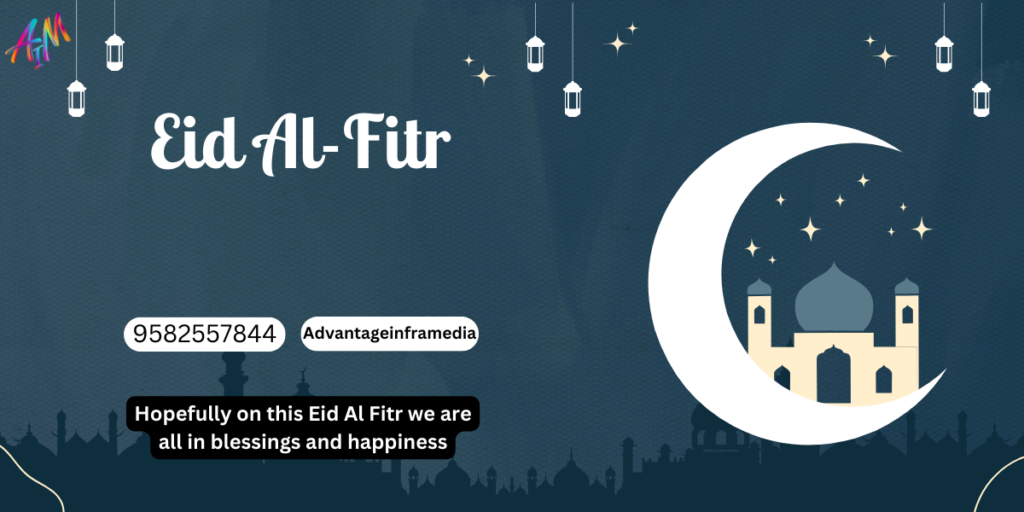Eid al-Fitr, also known as the Festival of Breaking the Fast, marks the end of Ramadan, the holy month of fasting observed by Muslims worldwide. It’s a time of great joy, gratitude, and celebration, as families and communities come together to mark the culmination of a month-long journey of spiritual reflection, self-discipline, and devotion. In this blog, we delve into the significance of Eid al-Fitr, its traditions, customs, and the universal messages of compassion, unity, and generosity it embodies.
Understanding Ramadan
- To truly appreciate Eid al-Fitr, it’s essential to understand the significance of Ramadan in Islam. Ramadan is the ninth month of the Islamic lunar calendar, during which Muslims fast from dawn to sunset, refraining from food, drink, and other physical needs as an act of worship and obedience to Allah. It’s a time for self-reflection, spiritual growth, and increased devotion through prayer, recitation of the Quran, and acts of charity.
The Spirit of Eid
- Eid al-Fitr is a celebration of spiritual renewal, forgiveness, and gratitude. As the crescent moon is sighted, signaling the end of Ramadan, Muslims around the world gather to offer prayers of thanks and seek forgiveness for any shortcomings during the month. It’s a time to express gratitude for the blessings received and to extend kindness and compassion to others, especially those less fortunate.
Preparations and Festivities
- In the days leading up to Eid al-Fitr, families engage in various preparations to make the festival special. Homes are cleaned and decorated, new clothes are bought or tailored, and delicious meals are prepared. Special sweets and delicacies, such as baklava, and sheer khurma, are made to share with loved ones and guests. The atmosphere is one of anticipation and excitement as communities eagerly await the joyous occasion.
Eid Prayer
- One of the central features of Eid al-Fitr is the congregational Eid prayer, performed in open spaces or mosques shortly after sunrise. Muslims gather in large numbers, dressed in their finest attire, to offer prayers of gratitude and unity. The Eid sermon emphasizes themes of forgiveness, charity, and community cohesion, reminding believers of their responsibilities towards one another and the importance of compassion and empathy.
Giving Zakat Eid al-Fitr
- Zakat al-Fitr, or Fitrana, is a charitable contribution given before the Eid prayer. It is obligatory for every Muslim, serving as a means of purifying one’s wealth and ensuring that the less fortunate can also partake in the festivities. The amount is calculated based on the value of staple food items and is distributed to those in need, allowing them to celebrate Eid with dignity and joy.
Festive Traditions
- Eid al-Fitr is characterized by various customs and traditions that vary across different cultures and regions. In addition to the prayers and charitable giving, families come together to exchange gifts, share meals, and visit relatives and friends. Children, in particular, look forward to receiving Eidi, monetary gifts given by elders as a token of love and blessings. Festive gatherings often extend into the evening, with music, dancing, and laughter filling the air.
Strengthening Bonds
- Eid al-Fitr provides an opportunity for families and communities to strengthen bonds and foster a sense of belonging and unity. It’s a time when differences are set aside, and people come together regardless of race, ethnicity, or social status. The spirit of generosity and hospitality prevails as homes are opened to guests, and acts of kindness and compassion abound. Through shared prayers, meals, and festivities, Eid reinforces the importance of solidarity and mutual support within the Muslim community and beyond.
Reflecting on Gratitude
- As the celebrations of Eid al-Fitr unfold, it’s important to pause and reflect on the deeper meanings of gratitude and thankfulness. The month of Ramadan teaches invaluable lessons about self-discipline, empathy, and resilience, and Eid serves as a culmination of those teachings. It’s a time to express gratitude not only for the material blessings but also for the spiritual growth and closeness to Allah experienced during Ramadan. Through acts of worship, charity, and fellowship, Muslims reaffirm their commitment to living a life of gratitude and service to others.
Spreading Joy and Kindness
- Eid al-Fitr is not only a celebration for Muslims but also an opportunity to spread joy and kindness to all. It’s a time to reach out to neighbors, colleagues, and acquaintances, regardless of their faith or background, and share the spirit of Eid through acts of generosity and compassion. Whether it’s inviting someone to join in the festivities, extending a helping hand to those in need, or simply offering a kind word or smile, the essence of Eid lies in spreading love and goodwill to all.
Conclusion
- In conclusion, Eid al-Fitr is a joyous celebration that encapsulates the essence of faith, family, and community. It’s a time to rejoice in the blessings of Ramadan, express gratitude for divine guidance and mercy, and strengthen bonds of kinship and solidarity. As Muslims around the world come together to mark this auspicious occasion, may the spirit of Eid inspire us all to strive for compassion, unity, and peace in our lives and communities. Eid Mubarak!




